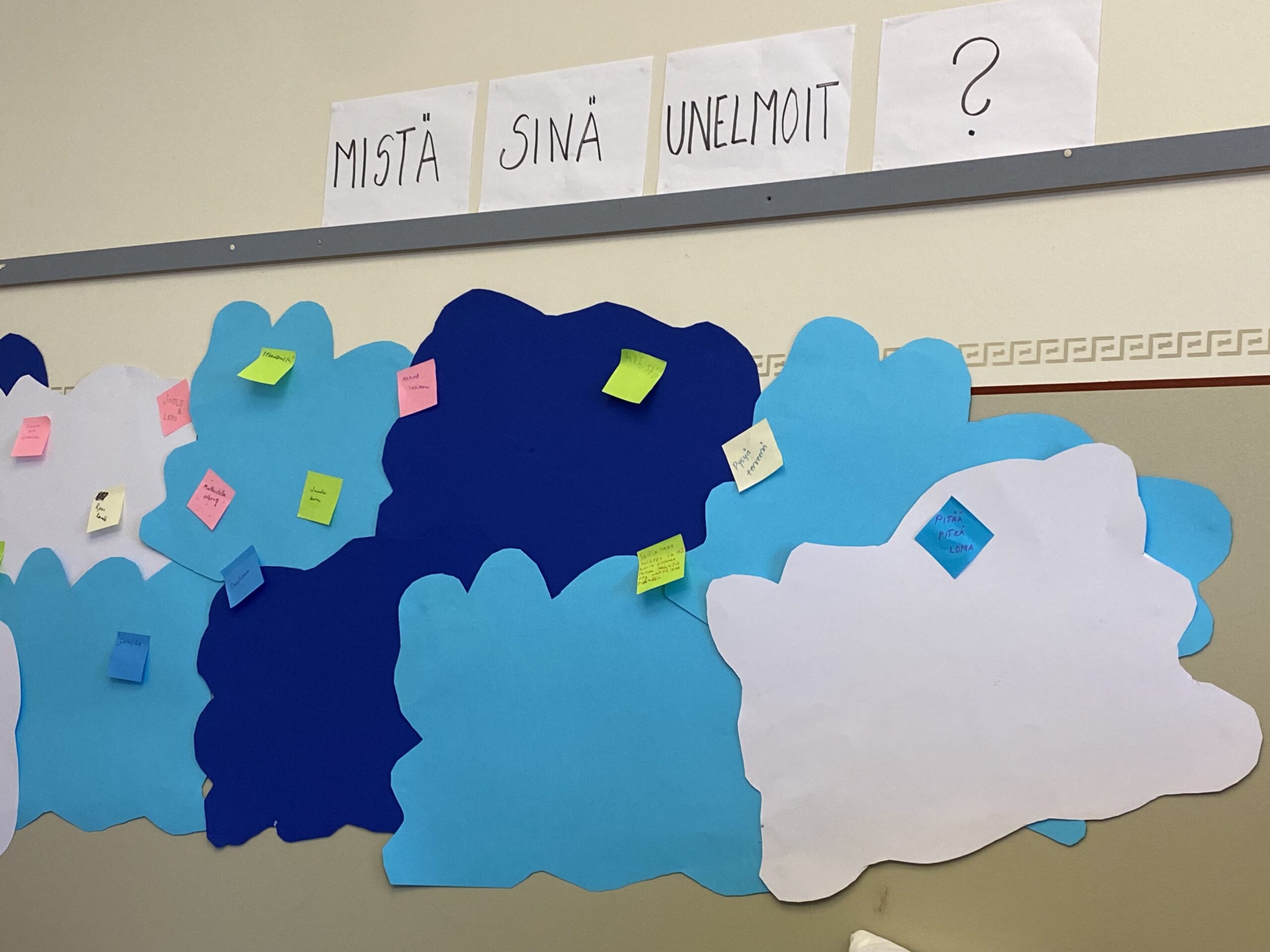Today I’m in Oulu – the biggest city in northern Finland, and about as far from Helsinki as Edinburgh is from London.
Oulu is home to the headquarters of Luovi Vocational College, the biggest provider of vocational special needs education and training in Finland, with over 30 locations across the country.
Colleges like Luovi are there to make sure that students who didn’t thrive in a conventional school setting don’t wind up at an educational dead end. The majority of students are between 16 and 18, with a wide range of additional support needs.
On the wall at Luovi is the question: mistä sinä unelmoit? What are your dreams? Visitors and students are invited to use post-it notes to add their own blue-sky thinking.
For many young people with additional support needs, it feels like dreaming isn’t encouraged. I often hear their dreams are unrealistic: people don’t want to raise expectations that can’t be met.
But not letting young people explore their hopes and dreams limits everyone’s aspirations. Life becomes only about what is clearly and obviously deliverable. It doesn’t help anyone – including people who support them – to think creatively, learn more about themselves and others, or develop skills and resilience.
It undermines hope.
A 16-year-old student I spoke to today said their dream was to be successful, have a good house, a motorcycle and a family. Another wanted to travel with her husband, be free and be young forever.
If we can’t help young people with additional support needs pursue dreams like these, what does that say about us? Life is limited indeed if these aspirations are hopelessly out of reach.
It seems to me we’ve managed to create and reinforce a system that isn’t giving many young people what they need.
Many in their mid to late teens would benefit from more time – to mature, try things out, think through who they are and what they want from life.
It’s especially true where development in one or more areas of their life may have been delayed for any reason.
Instead we have a pressure-cooker where the push is towards something – anything – that those around the young person consider meaningful.
It’s well intentioned. But “positive destinations” can turn out to be false starts. A college course that is too basic, or lacks the right support; a work placement that doesn’t interest or motivate; no plan to continue learning and stretching yourself.
At Luovi, students follow different vocational paths according to their ability, but I’m especially struck by the possibility for TUVA training – an integral part of the state education system. TUVA (too long in Finnish to give in full here) is open to students who have completed their basic education at 16, but need a breathing space and maybe more preparation before they are ready to progress to their next step.
This could mean time to gain a sounder grasp of the basics needed for work or study at a higher level, such as language skills or maths. It might mean time to focus on essential life management or social skills. It can include trying things out – shadowing a chosen job, for example, to find out if it is really right for them. There is no pressure to follow a particular path or qualification.
It’s about giving students who need it extra time to work out what their next step might be, and making sure things are in place to give them the best possible chance to succeed.
So when they take that step, it’s more likely to be with open eyes. Maybe they’ll have a better understanding of their own needs, and more strategies to manage them. They may have had time to think through different possibilities, explore and discard a few, and find out what matters to them.
When young people drop out of a “positive destination” because it isn’t sustainable or they don’t thrive, it comes at a cost to everyone involved.
Time, energy and valuable resource has been wasted on something that may never have been likely to succeed in the first place. And for the student there’s often frustration, a blow to their confidence, anxiety about having to start all over again, and a lack of guidance.
TUVA offers young people with additional support needs 38 weeks at a pivotal point to focus on who they are, what interests and motivates them, and what they need to succeed. It’s a real chance to keep things on track and help them to future success.
What a worthwhile investment.

Oulu is on the coast, just south of the Arctic Circle. This is a park in the city centre opposite the apartment I’m staying in. Spot the water beginning to freeze! Guess that’s it until March, then…
All opinions are my own and not those of any other organisation. However I am grateful to my colleagues at ARC Scotland for making this visit possible.

If you have a burning question you’d like to ask about Finland, feel free to leave a comment below and I’ll see if I can find the answer for you!


Leave a Reply